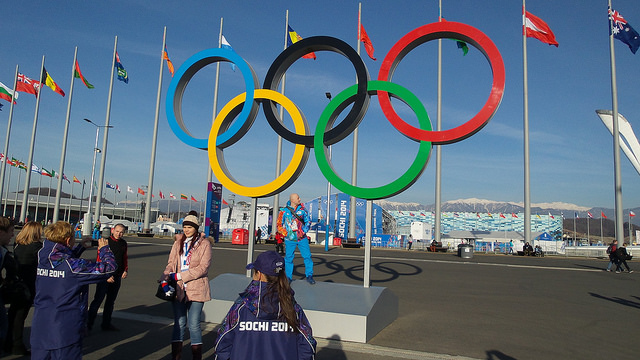You can change the conversation. Chip in to rabble’s donation drive today!
The sky is raining medals on Canadian and Quebec athletes. This is excellent news for all Canadians, but definitely more so for the Harper government and for the Parti Québécois government of Pauline Marois.
Both governments are plagued with corruption scandals but the Winter Olympic Games of Sochi seem to be giving them a free, long and happy ride.
The Senate scandal looked like it was coming to an end after senators Mac Harb and Patrick Brazeau were charged by the RCMP. Easy targets? Maybe. How about Pamela Wallin and Mike Duffy? Is this enough to close the dark chapter of bribes and unjustified expense claims of the other senators? And how about Nigel Wright, Stephen Harper’s former chief of staff who was found to have “paid” Senator Duffy a $90,000 cheque? We almost forgot about him. Will he be prosecuted for bribery?
Spying on Canadians by Communications Security Establishment Canada (CSEC) and its dangerous consequences for the lives of millions of Canadians was quickly declared legal by two high-ranking intelligence officers when questioned by parliamentarians.
Journalists didn’t even dare question the allegations of the two officials.
Meanwhile this same agency still receives taxpayer funds, estimated to be around $4.2 billion. Part of this money goes to build a fancy and luxurious building without any accountability or outcry from any member of Parliament.
The mere usage of technical vocabulary like “metadata” seems to have shut off many brains. CBC reported that “when asked to clarify the importance of metadata, Prime Minister Stephen Harper’s national security adviser explained it simply as ‘data about data.'” Using a technical and complicated vocabulary is a tactic to make citizens feel intimated, and thus somehow reassured by the degree of knowledge and expertise of our politicians and their bureaucrats. Meanwhile the real issue of spying on Canadians went off the radar and discussion focused on the definition of metadata and how insignificant its impact on privacy is.
Pauline Marois is also having a nice glide during the Winter Olympics season. Despite serious revelations about corruption in the construction and political milieu, she is still magically able to deflect attention by insisting on the importance of the “Charte des valeurs québecoises,” making it a wedge issue to gain more votes in the coming election. Even the serious allegation about a “deal” between her husband and some officials of the Fond de Solidarité du Québec was not judged serious enough by the media to seek answers.
Meanwhile, Canadian athletes are gleaning medals, making Canadians and Quebecers feel more euphoric. Forget about snooping, forget about corruption and secret deals, and forget about any cuts in the new federal budget. Canadians are happy, and for that Harper and Marois have Vladimir Putin to thank.
Monia Mazigh was born and raised in Tunisia and immigrated to Canada in 1991. Mazigh was catapulted onto the public stage in 2002 when her husband, Maher Arar, was deported to Syria where he was tortured and held without charge for over a year. She campaigned tirelessly for his release. Mazigh holds a PhD in finance from McGill University. In 2008, she published a memoir, Hope and Despair, about her pursuit of justice, and in 2011, a novel in French, Miroirs et mirages.
Like this article? Chip in to keep stories like these coming!
Photo: Val 202/flickr



